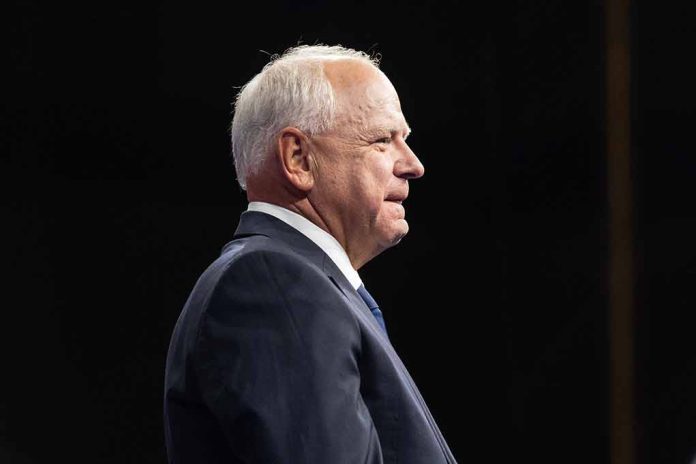
Minnesota Governor Tim Walz shockingly equates socialism to “neighborliness,” sparking outrage among conservatives and raising questions about the future of American economic policies.
At a Glance
- Governor Walz defends socialism as “neighborliness” on Fox News
- Walz advocates for “moral capitalism” and collective societal actions
- Republican lawmakers criticize Walz’s stance, calling it “radical”
- Walz implements progressive policies in Minnesota, raising concerns about tax hikes and government overreach
Walz’s Controversial Defense of Socialism
In a startling display of left-wing rhetoric, Minnesota Governor Tim Walz appeared on Fox News to defend his use of the term “socialism,” equating it to “neighborliness” and collective societal actions. This alarming redefinition of a system that has historically led to economic ruin and oppression has sent shockwaves through conservative circles.
Walz’s attempt to sugarcoat socialism as a benign concept of community cooperation is not only misleading but dangerous. His statement, “One person’s socialism is another person’s neighborliness,” ignores the fundamental differences between voluntary community action and government-mandated redistribution of wealth.
Tim Walz: “One person’s socialism is another person’s neighborliness.”
“Moral Capitalism”: A Trojan Horse for Socialist Policies?
While Walz claims to believe in capitalism, his advocacy for “moral capitalism” raises red flags. This vague term appears to be a clever disguise for implementing socialist policies under the guise of moral imperatives. Walz’s focus on public education and public health, while noble-sounding, often translates to increased government control and higher taxes for hard working Americans.
Tim Walz: "One person's socialism is another person's neighborliness"
This is the most extreme ticket in history. pic.twitter.com/59pqAunxfw https://t.co/Ou3PcPGUzZ
— Senate Republicans (@NRSC) August 6, 2024
The governor’s progressive agenda in Minnesota, including free school meals, expanded paid leave, and a more “progressive” tax system, aligns closely with socialist ideals. These policies, while presented as beneficial, ultimately lead to increased government dependence and a weakened free market economy.
Republican Pushback Against Walz’s Radical Agenda
Conservative lawmakers have rightfully sounded the alarm on Walz’s dangerous rhetoric and policies. Senator Mike Lee of Utah didn’t mince words when he described the Harris-Walz ticket as “the most radical ticket in American history.” This assessment is spot-on, considering Walz’s track record of implementing left-leaning policies in Minnesota.
Walz’s support for Vice President Kamala Harris’s proposed billionaire tax is particularly concerning. While it may sound appealing to some, such policies often backfire, driving wealth and job creators out of the country and ultimately hurting the middle class they claim to protect.
The Real Cost of Walz’s “Neighborly” Policies
Governor Walz’s economic policies in Minnesota provide a troubling preview of what he might advocate for on a national scale. His “tax-and-spend” approach, including tax hikes on the wealthy and increased government spending on social programs, mirrors the failed policies of socialist regimes throughout history.
The legalization of marijuana, implementation of a minimum wage for ride-share drivers, and billion-dollar housing investments all point to a government eager to interfere in private markets and personal choices. These policies, while presented as progressive solutions, often lead to unintended consequences such as reduced economic growth and job opportunities.
Conclusion: A Wake-Up Call for Conservatives
Tim Walz’s attempt to rebrand socialism as “neighborliness” and his push for “moral capitalism” should serve as a wake-up call for conservatives across the nation. The danger of these ideas lies in their ability to sound appealing while concealing the true cost of expanded government control and reduced individual liberty.
As we approach future elections, it is crucial for voters to see through the feel-good rhetoric and recognize the real-world implications of such policies. The choice between free-market capitalism and creeping socialism has never been clearer, and the stakes for America’s economic future have never been higher.






















